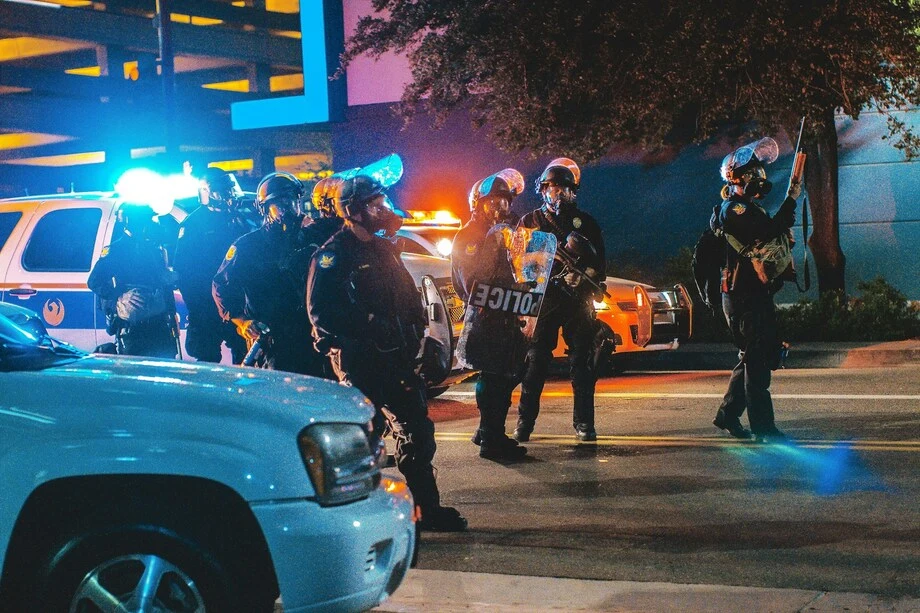When you’re walking down a street in your neighborhood and come face-to-face with the police, do you feel safe or fearful? Sadly, it is the latter for too many Missourians. Though the police are sworn to protect, they often overreach (by using unnecessary force, making wrongful arrests, or escalating situations that should have been peacefully resolved). What begins as a routine interaction can quickly spiral into a nightmare of violence, trauma, and lasting physical or emotional harm.
Victims of police brutality often wonder: Do I have rights? Can I pursue justice? How do I report police misconduct? This article will explain the legal options available to persons who have suffered from police misconduct.
What Is Police Brutality and How Is It Legally Defined?
Table of Contents
TogglePolice brutality is a form of misconduct where law enforcement officers use excessive force to control, detain, or arrest someone. Under U.S. law, using more force than necessary crosses the line from lawful enforcement to violating a person’s constitutional rights.
Officers are legally permitted to use force when necessary. For example, when a suspect actively resists arrest, the officers may use force to subdue them. It is lawful enforcement if the officers use force that is reasonable and proportionate to the situation. However, using more force than is necessary is considered police brutality.
U.S. Police Brutality Statistics That Demand Attention
Despite several national protests against police brutality, the cases of police misconduct in the U.S. are still staggering.
For example, according to Mapping Police Violence
- Police killed 1,367 people in the U.S. in 2024, amounting to 1 death every 6.4 hours. And there were only 11 days in the entire year without a police killing.
- As of April 12, 2025, police had already killed 368 people in the U.S., equating to a death every 6.6 hours. Shockingly, in the first 102 days of 2025 (from January 1 to April 12, when the report was last updated), there had not been a single day without a police killing.
- Of the 1,367 police killings across the United States in 2024, 33 occurred in Missouri. And of the 368 killings so far in 2025, 13 took place in Missouri.
The stats on non-fatal police brutality cases also do not make for good reading. For example, according to the Guardian:
- Police use force on about 300,000 individuals every year, resulting in about 100,000 injuries. These non-fatal incidents involved chemical sprays, stun guns, K9 dog attacks, baton strikes, neck restraints, and beanbags.
Types of Police Misconduct That May Lead to Injury Lawsuits
The most common police misconduct cases that lead to injury lawsuits are:
- Excessive force. Using more force than necessary to subdue and arrest an individual, even if the arrest is lawful. This includes beating, chokeholds, improper use of pepper spray and stun guns, and more. For example, in 2024, a federal judge awarded Luther Hall over $23 million in damages after he was severely beaten by some police officers during a protest.
- False arrests or unlawful detention. Detaining or arresting an individual without probable cause or a legal warrant. For example, in 2022, Kansas City police settled with Tyree Bell for $900,000 after wrongfully detaining him for three weeks.
- Improper use of restraint. Such as leaving a restrained suspect in a dangerous position.
- Verbal abuse and intimidation. Such as using threatening language or racial slurs.
- Wrongful use of deadly force. Such as using a firearm against someone who poses no immediate threat.
What Rights Do You Have if You’re Harmed by Police?
If you have been harmed by law enforcement, you have the right to sue. The Federal Civil Rights law, known as Section 1983, allows individuals to sue government officials (including police officers) for violating their constitutional rights while acting in their official capacity.
Know that filing a personal injury claim against police officers can often be challenging because of their qualified immunity. This immunity protects the police against legal actions when they are accused of negligence while performing work-related activities.
However, a skilled and knowledgeable police misconduct attorney can guide you to victory. For example, in its 2020 ruling on Taylor v. Riojas, the U.S. Supreme Court ruled that qualified immunity did not apply to correctional officers because of their egregious mistreatment of the petitioner.
Compensation You May Be Entitled to After a Police Encounter
If the police hurt you physically or emotionally, you may be entitled to damages to help restore what was lost and provide some measure of relief from your suffering. Damages you may seek include:
- Medical expenses: You may receive compensation for all medical expenses resulting from the encounter.
- Lost wages or loss of earning capacity: You may be compensated for lost income (if the injuries prevented you from working) or for reduced earning potential (if you’re unable to return to your previous job or career). Luther Hall’s $23 million settlement included compensation for the life-altering injuries that now prevent him from returning to his previous undercover assignments.
- Pain and suffering: You may be compensated if the encounter leaves you with physical pain, emotional distress, or psychological trauma. For example, Mack Nelson received a $500,000 settlement after being thrown to the ground by Kansas City police officers in 2022. The settlement accounted for his physical injuries and the emotional trauma he endured
- Property damage: You may receive compensation for any damage to personal property (such as a phone or vehicle) during the encounter.
- Punitive damages: When the officer’s behavior is egregious, courts may award punitive damages to deter future misconduct.
- Legal costs: The court may order police to pay your legal costs (attorney fees, court costs, etc.). For example, $458,000 of the $900,000 settlement received by Tyree Bell for his wrongful detention was for attorney’s fees and costs.
- Wrongful death damages: If a police encounter results in the death of your loved one, you may receive compensation for burial expenses, loss of future income the individual would have provided, loss of companionship and support, and emotional suffering. For example, an undisclosed settlement was reached with Hannah Fizer’s father in 2023 in the wrongful death lawsuit he filed against a Pettis County deputy for killing Fizer during a traffic stop.
How Long Do You Have to File a Claim Against Law Enforcement?
In Missouri, the statute of limitations for police misconduct lawsuits is 5 years. This means you can sue police officers for civil rights violations within five years from the date of the incident. However, if your lawsuit involves a government agency (such as the police department, the city, or a public board like a police commission), you must provide notice of your claim within 90 days of the incident.
How to Report Police Misconduct and Protect Your Case
Hurt or injured by police officers? Here’s how to report the misconduct and protect your case:
Step 1: Seek medical help
Your health should come first. Get to safety and seek medical attention (even if your injuries seem minor) as soon as possible. Also, request documentation of the treatment.
Step 2: Document everything
Record everything you can about the encounter. Take photos of injuries, damaged property, or the surroundings. Write down what was said or done and the names and contact information of any witnesses. Write down the date, time, and location of the encounter as well as the name and badge number of officers (if possible).
Step 3: Preserve photo or video evidence
If you or a bystander recorded the incident, secure the footage.
Step 4: File a police misconduct report
Officially file your complaint in writing and keep a copy. If you’re wondering where to report police misconduct in Missouri, you can file your complaint with:
- The Police Department’s Internal Affairs unit
- A local civilian oversight board (such as the St. Louis City Civilian Oversight Board).
- The Missouri Attorney General’s office.
Step 5: Contact civil rights or police misconduct attorneys
Engaging a police misconduct lawyer as soon as possible will help you understand your rights and avoid missteps that could hurt your case.
Fighting Back Matters—You’re Not Alone
The police should protect you, not harm you. If the police have hurt you or anyone you know, know this: you’re not powerless. You have the right to seek justice.
Seeking justice may seem overwhelming, but not when you have experienced police misconduct lawyers with you. This is where Royce Injury Attorneys come in!
With over 65 years of combined experience, a broad range of injury claims, and a proven record of successfully landing worthwhile compensation, Royce Injury Attorneys is the go-to law firm for police misconduct in Missouri.
Ready to get justice for police brutality? Contact Royce Injury Attorneys today.
He has founded multiple law firms and has personally represented over 20,000 clients. His firms have helped over 250,000 clients.
At Royce Injury Lawyers, personal injury law is all we do. Whether you've been hurt on the job, had an auto accident, nursing home injury, or experienced medical malpractice, you can count on our attorneys and investigators to work for you.
- Key Facts About Missouri’s No Pay No Play Law - 28th May 2025
- Understanding Taxes on Personal Injury Settlements - 23rd May 2025
- Navigating Your Rights After a Car Crash While Pregnant - 21st May 2025


